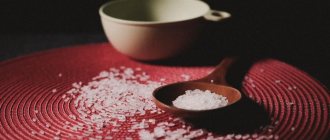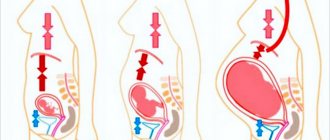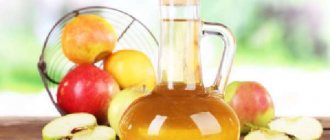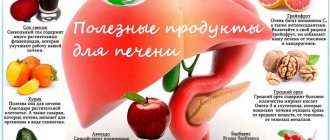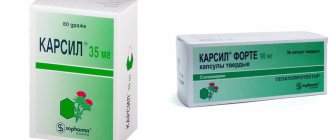Once I went to visit a friend to drink tea, and on her table there was a sugar bowl, which didn’t contain sugar, but something I didn’t understand. To the question: “What is this?”, a friend replied that the doctor advised her husband to take milk thistle for the liver. Just before each meal, take a tablespoon of Milk Thistle seed powder and swallow with water! That's all! No Heptrals, Essentiale and Karsila! Cheap and cheerful! I was surprised. Is milk thistle effective for liver diseases? What medicinal properties does it have? How to take it correctly? Are there any contraindications? Let's figure it out together.
Main active ingredients of Milk Thistle
Its bioactivity is provided by flavonoids, saponins, vitamins K and C, flavonolignans, tyramine, and alkaloids.
Silymarin (the most active component) supports the production of glutathione, a tripeptide that prevents free radicals from damaging vital cellular components. The antioxidant is destroyed under the influence of toxins, medications, stress, radiation, and during the aging process.
Milk thistle neutralizes the effect of these factors, cleansing the liver and normalizing the production of glutathione.
Milk thistle oil for liver treatment
Milk thistle oil
Medications are not prescribed to people with mental disorders and cardiovascular diseases. Milk thistle oil is used in combination with other drugs to treat the liver. Perfectly helps to cope with cholecystitis, cholangitis, phlebotomy, toxic liver damage and fatty liver.
Medicinal properties of Milk Thistle
Detoxification
Milk thistle restores the liver by eliminating toxins deposited in the cells. Neutralizes the effects of alcohol and pesticides.
Activates the liver's production of hormones (thrombopoietin, angiotensin, hepcidin, somatomedin C) that stimulate cell growth, affecting platelet production and iron homeostasis.
Thanks to its choleretic properties, it improves the absorption of nutrients in the small intestine.
Effective in the treatment of alcoholic, viral hepatitis, cirrhosis, and toxin-induced diseases.
Reducing cholesterol
Silymarin improves the lipid profile, normalizes protein metabolism, preventing the accumulation of fats on the vascular walls and their calcification.
Diabetes control
The formation of insulin resistance provokes, among other things, metabolic syndrome. Milk thistle, normalizing the metabolism of fats and carbohydrates, reduces the amount of visceral fat and increases the synthesis of leukogen.
Stimulation of bile formation
One of the functions of the liver is digestive. Milk thistle activates the secretion of bile, which flows from the gland into the gallbladder, and then into the duodenum.
Prevents the formation of gallstones - stones consisting almost entirely of cholesterol.
Cancer Prevention
Milk thistle fruits include flavolignans. In addition to a pronounced hepatoprotective effect, they enhance the functions of the immune system, resist DNA damage, and inhibit the development of cancer tumors. They activate protein synthesis, strengthening the membranes of healthy cells, blocking the fusion of toxins and pathogens with cell membrane receptors. Protects skin from ultraviolet-induced oxidative stress, preventing the development of melanoma.
Properties of meal that are beneficial for the liver
Milk thistle powder is used in traditional medicine as a natural hepatoprotector. In addition, the crushed plant allows you to cleanse the body during treatment, acting as a sorbent.
The benefit of the powder also lies in the fact that its components can act as antioxidants.
Use as a medicine allows you to treat fatty hepatosis and cirrhosis of the liver. If used correctly, the product has a noticeable choleretic effect on the body.
Taking a powder prepared from an annual plant helps improve digestive function, helps the formation of enzymes that enhance bile production, and also stops the inflammatory process.
Indications for the use of milk thistle capsules are the presence of the following pathologies and conditions in the patient:
- alcohol intoxication;
- poisoning and liver damage from industrial toxic compounds;
- if it is necessary to detoxify the body after taking antibiotics and other medications that have hepatotoxic properties and can accumulate in the liver;
- with liver damage from the bite of poisonous snakes and poisoning by toadstool poisons.
Conducted studies confirm that the combination of milk thistle with traditional drug therapy for diabetes mellitus improves the condition of the body of a patient suffering from the second type of pathology. In patients, the concentration of sugar in the body is leveled and the concentration of cholesterol is reduced.
As an antioxidant, milk thistle powder is not inferior in its effect on the body to vitamins C and E. The active components of the product resist free radicals and significantly slow down aging.
Beneficial properties of silymarin
The main active component of marina thistle is silymarin. This bioactive composition has anti-inflammatory and antioxidant properties.
Silymarin contains seven components that are found only in milk thistle.
Silymarin components take an active part in the processes of protein synthesis in cells. This property of the biologically active complex is used in therapeutic measures aimed at restoring liver parenchyma cells.
The use of meal increases the rate of protein biosynthesis at the cellular level and has a stimulating effect on the subsequent restoration of damaged liver cells.
Through its active actions, silymarin blocks the outer layer of cells, preventing the penetration of toxic compounds into hepatocytes. The blocking of the outer layer occurs due to its restructuring and changes under the influence of the components of the bioactive complex.
In addition to stimulating cell repair and growth, as well as reducing inflammation, silymarin has an antioxidant effect on the body.
The complex has a positive effect when used in cases of diabetes and improves insulin resistance.
Who and when is Milk Thistle useful?
Here are just a few useful recipes.
- When consuming crushed milk thistle fruits, the daily dose should not exceed three teaspoons. An infusion is prepared from them by pouring three glasses of boiling water for 20 minutes. Take the filtered liquid in a glass (you need to drink it in small sips) three times a day. The product has a choleretic effect and relieves hangovers. The same decoction can be used to rinse the mouth for toothache and stomatitis.
- An infusion - a teaspoon of seeds in a glass of boiling water - will relieve coughs. You need to take it half a glass four times a day.
- Milk thistle is also used in cooking (all parts of the plant are edible):
- the leaves can be included in salads, like spinach;
- seeds – in soups, smoothies, or added in ground form to coffee;
- young shoots (pre-soaked for a couple of hours) - boil and use similarly to cabbage, including in first courses;
- crushed roots are also added to salads, pureed soups, and sauces.
How to take milk thistle correctly to benefit the liver: tips and reviews
Milk Thistle in the Field
Consult your healthcare professional before taking milk thistle. If the patient has contraindications, he will definitely say so, or, conversely, if they are absent, he will prescribe capsules of the drug for complex treatment.
Every person wants to take milk thistle correctly to benefit the liver, so here are some tips:
Advice: Start using the decoction, tincture or oil with small doses. If the body takes the medicine normally, then you can increase the dose to the recommended dose and continue treatment.
Advice: Doctors say that silymarin, the active ingredient in milk thistle, is destroyed when exposed to light and high temperatures. Therefore, the use of decoction and tea does not give the desired results. It is better to use alcohol tincture, milk thistle powder or capsules.
Reviews about medicinal products based on this medicinal plant are only positive. People are cured of hepatitis, either with milk thistle alone or in combination with other effective drugs.
The liver is our natural filter, so it needs to be helped and protected from toxins and other harmful effects. Milk thistle will do an excellent job of these functions. Consult a doctor, get treatment and be healthy!
How and when is milk thistle useful for the liver?
What liver diseases does Milk Thistle treat?
The list of liver diseases for which Milk Thistle is effective is impressive:
- alcoholic hepatitis (in my practice as a narcologist it occurs all the time!);
- fatty liver hepatosis;
- toxic damage to the liver by poison (for example, heavy metals, mushrooms);
- chronic hepatitis;
- gallbladder problems.
How Milk Thistle is useful for our liver and how Silymarin acts on it
Milk thistle has three medicinal effects on the liver:
- detoxification;
- hepatoprotective;
- regenerating.
This effect is explained by the presence of silymarins in Milk Thistle. There are up to 12 varieties of them!
It is silymarin that explains the hepatoprotective properties of Milk Thistle. These include the following abilities:
- antifibrotic;
- membrane stabilizing;
- regenerating;
- anti-inflammatory;
- antioxidant.
How to take Milk Thistle correctly to cleanse the liver
It is believed that Milk Thistle “works” better at night from one to three. Therefore, be sure to use it at night.
If you take Milk Thistle for a long time, it has a somewhat depressing effect on the nervous system. Lethargy, drowsiness, and low blood pressure may appear. Therefore, it makes sense to add Chinese Schisandra or Pantocrine to the treatment (20 drops before meals in the morning and afternoon).
I believe that treating the liver with tea, decoction or oil from Milk Thistle does not make sense, since the “magic” silymarin (for which we use Milk Thistle) is very unstable and is easily destroyed in light, at temperatures above 60 degrees and under the influence of oxygen.
How to “cover” the liver?
Hepatoprotectors are drugs that “protect” the liver. They are able to eliminate the harmful effects of drugs. Almost 700 such drugs are registered in Russia. They make up for the deficiency of substances necessary to neutralize toxic products of drug metabolism, prevent the destruction of cell membranes, eliminate inflammation, improve blood circulation in the liver and bile outflow, slow down the development of fibrosis and reduce it.
There are several groups of drugs that restore liver health undermined by medications:
- silymarin preparations (from milk thistle)
- essential phospholipids
- drugs of other groups - ademetionine, bile acids, amino acids, glycyrrhizic acid
- their combinations.
Each of the drugs has its own indications and limitations. It is important to remember that only a competent doctor, after examination, can prescribe the optimal course of treatment for your problem.
How to use Milk Thistle for the liver at home
Of course, you ask me, is it possible to make medicine from Milk Thistle for the liver yourself at home? Yes!
Use of Milk Thistle Seeds in Powder and Sprout Forms
The easiest and most effective way: grind Milk Thistle seeds in a coffee grinder and immediately take a tablespoon before meals three times a day.
The powder cannot be stored for a long time, as it loses its medicinal properties. Make a reserve for one day.
I have friends who germinate the seeds before using them. They use it the same way.
Alcohol tincture from milk thistle seeds
You can prepare it in different ways. Here's one way:
For one part of seeds you need to take five parts of alcohol or vodka. Leave for ten days in a cool, dark place.
Directions for use: from 2 to 20 drops at a time. The use must be coordinated with a doctor, since the tincture is potent.
Milk thistle capsules for the liver
Milk thistle in capsules
Many people are too lazy to brew a decoction or tea from herbs, so it is more convenient for them to take medications in tablet form. Milk thistle capsules for the liver are a convenient and effective treatment, as one capsule contains a single dose of the herb for an adult.
But the dose can also be calculated by the doctor on an individual basis. If the patient has an advanced form of the disease, then the doctor will prescribe the use of two capsules per dose.
What medicines are there from Milk Thistle, their pros and cons
Milk thistle tablets
| Name | When to use | Peculiarities | Contraindications |
| SIBEKTAN | Alcoholic hepatitis, cirrhosis, hepatitis, cholecystitis | Contains not only milk thistle, but also tansy, St. John's wort and birch extracts | Pregnancy and breastfeeding |
| SILIBOR | Alcoholic hepatitis, infectious and toxic liver damage | Allergic | Acute poisoning |
| KARSIL | Alcoholic hepatitis | Good bioavailability | Individual intolerance |
| SILIMAR | Hepatitis, toxic liver damage, cirrhosis | Antioxidant and regenerating effect | Individual intolerance |
Tablet forms of Milk Thistle
Milk thistle powder (capsule form)
| Name | When to use | Peculiarities | Contraindications |
| LEGALON | Alcoholic hepatitis, cirrhosis | Many bioactive compounds | Individual intolerance |
| LIPOSIL | Fatty hepatosis, hangover syndrome, cirrhosis, alcoholic hepatitis, as a preventive measure | Accelerates blood purification, anticarcinogenic and antitumor effects | Individual intolerance |
| BONJIGAR | Alcoholic hepatitis, alcoholic anorexia, fatty hepatosis | Comes in syrup form | Pregnancy, breastfeeding period, age up to 18 years |
| GEPABEN | Cirrhosis, fatty degeneration, alcoholic hepatitis, bile duct dyskinesia | Normalizes bile production. Used after gallbladder removal | Acute diseases of the liver and bile ducts; age up to 18 years |
Capsule forms of Milk Thistle (powder)
Milk thistle in the form of meal
What is meal? Cake! This is a ready-made mixture in the form of powder, flour from plant residues after pressing the oil. Of course it's convenient! You don't have to do anything yourself!
But, in my opinion and some of my colleagues, this is a “dummy”! After all, Silymarin in the meal collapsed long ago after contact with air and light!
Contraindications to the use of meal
Milk thistle meal is produced in the form of capsules and powder. How to take milk thistle meal for the liver is prescribed by the instructions for use attached to the drug.
Mary's thistle is successfully used in drug therapy for hepatitis, cirrhosis and cholecystitis. The medicine can be used for fatty liver and to cleanse the body.
Like any drug, meal has its contraindications. There are a minimal number of such contraindications due to the natural origin of the product.
It is not recommended to use it:
- When treating patients under three years of age.
- In case of individual intolerance to the components included in milk thistle.
Even pregnant and nursing mothers can drink milk thistle.
When using the drug, according to the reviews of the majority of patients who used it in accordance with the instructions for use, no side or negative effects appear in the body.
The only thing you need to pay attention to when using a medication is the need to consult with your doctor before starting to take it.
When carrying out therapeutic measures using marin thistle meal, one should remember the possible occurrence of side effects if the recommendations for use are not followed.
Negative manifestations can be expressed in the form of digestive system disorders. The patient appears:
- diarrhea;
- attacks of nausea;
- bloating.
In addition, skin rashes may occur. If these symptoms appear, you should stop taking the dietary supplement.
When not to use Milk Thistle for the liver
I am sure you have already appreciated this wonderful herb! From my medical experience, I confirm that milk thistle is very effective for liver pathology!
But there are contraindications when milk thistle is not suitable for the liver:
- It can cause intestinal upset (diarrhea, cramps, flatulence), an allergic reaction (especially with intolerance to ragweed pollen, chrysanthemums, daisies, marigolds), nausea, loss of appetite, and headache.
- It is not recommended for use during pregnancy, lactation, treatment of uterine, ovarian, breast cancer, endometriosis or fibroids (due to the effect on estrogen production).
- Milk thistle interacts with antihistamines, antidepressants, anticoagulants, anxiolytics, non-steroidal anti-inflammatory, antihypertensive, antidiabetic, lipid-lowering drugs, estrogen antagonists, statins, potassium channel blockers, analgesics, benzodiazepines, morphine.
Remember: the use of milk thistle in any of its forms requires compliance with the dosage and prior consultation with a doctor about the possibility of taking it.
How to “clean” the liver?
You can often read advice on this topic on the Internet or listen to those who engage in such “cleansing” regularly. Even despite the fact that hepatologists say: there is no “golden pill”. The liver is a unique and complex organ that cannot be cleaned; its functions are restored by a healthy lifestyle and proper treatment of a specific problem.
Of course, drugs to improve liver function exist. But these are also medications, which means that in addition to their benefits, they have contraindications and side effects. As with popular folk herbal recipes or dietary supplements. And if you use them incorrectly and not according to doctor’s instructions, you can harm yourself.
Therefore, when and how to “cleanse the liver” and what to eat during the “cleanses” is decided by your hepatologist, based on your condition and examination results.
Remember: the liver does not hurt until the very last stages. Don't go to extremes - the next time you take a pill for a headache or "prescribe" yourself an antibiotic, think about the liver. Hepatologists at the EXPERT gastro-hepatocenter are ready to help avoid danger.
Fats for the liver
One of the most frequently prescribed groups of hepoprotective agents for liver treatment is essential phospholipids. They are similar in structure to endogenous phospholipids of cell membranes, but contain a larger amount of polyunsaturated fatty acids. They are believed to restore damaged membranes in hepatocytes and have antioxidant and antifibrotic effects (1, 2, 3). This class of drugs is generally well tolerated, but may cause diarrhea. In addition, some parenteral forms appear to have a negative effect in pre-existing cholestasis (1). There are combined forms containing phospholipids and glycyrrhizic acid, as well as phospholipids in combination with vitamins and methionine (an essential amino acid associated with the synthesis of endogenous phospholipids and the neutralization of xenobiotics).
Liver and placenta
The group of hepatoprotectors of animal origin includes drugs obtained from animal liver and human placenta. According to the manufacturers' instructions, hepatoprotectors of this group stimulate the regeneration of hepatocytes and have an antioxidant effect. However, they may also be unsafe for some patients, like other drugs of biological origin. Thus, patients with active forms of hepatitis have a risk of worsening their condition, in addition, there is a risk of developing allergic reactions. The use of cattle liver can be dangerous in terms of the spread of prion neurodegenerative diseases (5).


